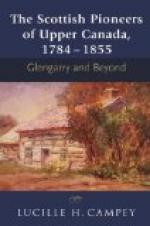These Massachusetts “Indians” described to Champlain a wonderful bird which at some seasons of the year they caught in snares and ate. This Champlain at once guessed was the wild turkey, now, of course, quite extinct in that region. This wild turkey of the eastern half of North America (including southern Canada) was quite a distinct form from the Mexican bird, which last is the origin of our domestic turkey.
In July, 1606, as De Monts had not returned from France, and the little colony at Port Royal was without supplies, they decided to leave two Frenchmen in charge of the local chief of the Mikmak Indians, and find their way along the coast to Cape Breton, where they might get a fishing vessel to take them back to France. But after travelling in an open boat—a chaloupe—round the coast of Nova Scotia they met another small boat off Cape Sable, under the charge of the secretary of De Monts, and learnt that Lieutenant-General DE POUTRINCOURT[18] (one of the great names amongst the pioneers of Canada, and the man who had really chosen Port Royal for the French headquarters at Nova Scotia) had already returned from France with fresh supplies. Consequently, Champlain and his companions returned to Port Royal, and all set to work with eagerness to develop the settlement. Champlain relates in his book how he created vegetable gardens, trout streams and ponds, and a reservoir of salt water for sea fish; but he was soon off again on a fresh journey of exploration, because De Monts was not satisfied with Nova Scotia on account of the cold in winter. Accordingly Champlain examined the whole coast round the Bay of Fundy, and down to Cape Cod, and the islands of Martha’s Vineyard and Nantucket. But in this region, already visited in past times by French, Spanish, and English ships, they found the natives treacherous and hostile. An unprovoked attack was made on the French after they landed, and several of the seamen were killed with arrows.
[Footnote 18: Jean de Biencourt, the Sieur de Poutrincourt and Baron de Saint-Just, were his full titles.]
On the 24th of May, 1607, a small barque of six or seven tons burden (fancy crossing the wide Atlantic from Brittany to Nova Scotia in a ship of that size at the present day!) arrived outside Port Royal from France, with an abrupt notification that De Monts’ ten years’ monopoly and charter were cancelled by Henry IV, and that all the colony was to be withdrawn and brought back to France. Henry IV took this action simply because De Monts attempted to make his monopoly a real one,[19] and stop the ships of fur traders who were trading with the Amerindians of Cape Breton without his licence. These fur traders of Normandy then complained bitterly that because De Monts was a Protestant he was allowed not only to have this monopoly, but to endanger the spiritual welfare of the savages by spreading his false doctrines! So King Henry IV, volatile and capricious, like most of the French kings, cancelled a charter which had led to such heroic and remarkable results.




